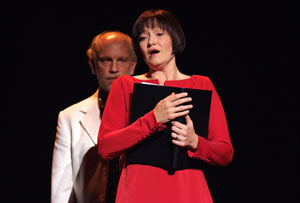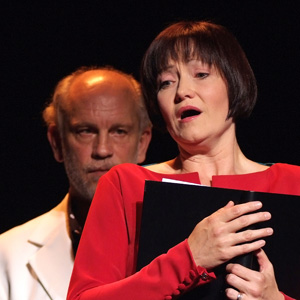True-Crime Character: John Malkovich as Jack Unterweger (writer, serial killer, and all around creepy dude)
 Hill Auditorium is not a typical setting for a piece of theatre. After the lights go down, it’s mainly a great big sound box. Hmmm, let’s see, is there any way you could actually get people to look at the stage, instead of sliding down in their seats for an excellently sound-tracked doze?
Hill Auditorium is not a typical setting for a piece of theatre. After the lights go down, it’s mainly a great big sound box. Hmmm, let’s see, is there any way you could actually get people to look at the stage, instead of sliding down in their seats for an excellently sound-tracked doze?
How about you put John Malkovich up there with a Dr. Strangelove accent, doing that snakey walk of his around a forty-piece orchestra and strangling a couple of sopranos with brassieres while they sing Mozart lieder? That roadshow actually exists and is coming to Hill Auditorium on October 1 at 8 pm. The show is called The Infernal Comedy: Confessions of a Serial Killer, a performance piece in which Malkovich plays a real person, Austrian serial killer Jack Unterweger.
Written by Michael Sturminger, what happens onstage appears to be mostly a fictional delving into Unterweger’s brain, though had Unterweger not dispatched himself in 1994, he might well have written it himself. As a theatrical concept, it’s hands-down brilliant. Forget Unterweger for a minute. It seems to me that for a small European country, Austria has produced disquieting amounts of both sublime beauty and creepiness. The Infernal Comedy sounds like the answer to some challenge like: “explain, in a performance piece, what’s the deal with Austria?”
As for Unterweger himself, who, I almost want to say, never got the fame he deserved, you can read a full account of him in John Leake’s Entering Hades: The Double Life of a Serial Killer (Farrar, Strauss & Giroux, 2007). Briefly, young punk Unterweger was sentenced to life in prison in 1975 for murdering a young woman. While in prison, he educated and redeemed himself, writing prose and poetry that dazzled the high literati of Austria. They in turn pressured the court system to pardon him in 1990. The now urbane and educated Unterweger immediately became a celebrity journalist, specializing in reporting on prostitute murders. Oddly, it took the Austrian gendarmerie a while to remember that Austria didn’t really have a problem with prostitute murders until Unterweger started reporting on them. He was caught, tried, and hanged himself on the way to prison.
A few days ago, I talked to Gregg Barak, professor of criminology at EMU, about Unterweger. He began by throwing me a curveball about my use of the term “psychopath” to describe him.
“Absolutely not a psychopath,” insists Barak, “and neither was Ted Bundy, for that matter.” This shakes the bedrock upon which my, and perhaps your, notions of sexual serial killer crime are founded. Barak’s argument is dense and complex, and deserves a fuller airing than I can give here. Instead, I’ll just pick out a few other standout comments from our conversation.
Unterweger was, says Barak, the smartest, most fascinating serial killer ever, bar none. “How many go to prison and say: ‘I’m going to write my way out of here.’?” he asks. “Probably a pretty high percentage. How many actually do?” And not just with some one-note self-absorbed autobiography, like Jack Abbott (better remembered as an uncomfortable moment in Norman Mailer’s life). Unterweger, says Barak, “was writing in all genres: fiction, poetry, plays, childrens’ literature.” As evidence of his highly organized, complex, and multilayered mind, Barak notes: “he was having straight sex, kinky sex, and killer sex, all during the same period of time.”
U-M Students who want to hear more of Barak’s line of argument can hear him talk at the Arts & Eats pre-show event on October 1. Others can read one of his books or snag him — he’s a pretty personable guy — at intermission.
11/12 Choral Union Series
Within the signature Choral Union Series, UMS presents 10 concerts in historic Hill Auditorium:
Subscription packages go on sale to the general public on Monday, May 9, and will be available through Friday, September 17. Current subscribers will receive renewal packets in early May and may renew their series upon receipt of the packet. Tickets to individual events will go on sale to the general public on Monday, August 22 (via www.ums.org) and Wednesday, August 24 (in person and by phone). Not sure if you’re on our mailing list? Click here to update your mailing address to be sure you’ll receive a brochure.
John Malkovich in The Infernal Comedy: Confessions of a Serial Killer
with The Vienna Academy Orchestra
and sopranos Valerie Vinzant and Louise Fribo
Martin Haselböck, conductor
Saturday, October 1, 8pm
John Malkovich makes his UMS debut as a dead serial killer who returns to the stage to present his autobiography in a public reading. Malkovich appears as part of a theatrical opera of sorts that features a 40-piece chamber orchestra and two sopranos telling the real-life story of Jack Unterweger, a convicted murderer and acclaimed prison poet who had been pardoned by the Austrian president Kurt Waldheim in 1990 at the behest of Viennese literati. This gripping performance uses arias and music by Gluck, Vivaldi, Mozart, Beethoven, Boccherini, and Haydn as the counterpoint to Malkovich’s emotional monologue, which shifts between reality and delusion.
Yuja Wang, piano
Sunday, October 9, 4pm
Twenty-four-year-old Chinese pianist Yuja Wang is widely recognized for playing that combines the spontaneity and fearless imagination of youth with the discipline and precision of a mature artist. She made her UMS debut in January 2008, just months after graduating from the Curtis Institute of Music, and since then has spent each year criss-crossing the globe with a cavalcade of impressive debuts and awards, including the prestigious Avery Fisher Career Grant, given to select musicians destined for bright solo careers.
Program
Ravel | Miroirs
Copland | Piano Variations
Rachmaninoff | Selected Preludes
Brahms | Sonata No. 1 or No. 3
Apollo’s Fire with Philippe Jaroussky, countertenor
Jeannette Sorrell, music director
Thursday, November 3, 8pm
UMS is delighted to welcome French countertenor Philippe Jaroussky in his UMS debut for this performance with Apollo’s Fire, “one of the nation’s leading baroque orchestras.” (Boston Globe) Named for the classical god of music and the sun, Apollo’s Fire was founded in 1992 by the young harpsichordist and conductor Jeannette Sorrell, who envisioned an ensemble dedicated to the baroque ideal that music should evoke various passions in its listeners. Together they explore the full dramatic range of Handel and Vivaldi’s arias for the virtuoso castrato singers of the 18th century.
Program
Handel | “Disperato il mar turbato” from Oreste
Handel | “Con l’ali di costanza” from Ariodante
Vivaldi | Concerto for Four Violins in b minor
Vivaldi | “Se in ogni guardo” from Orlando Finto Pazzo
Vivaldi | “Se mai senti spirati sul volto” from Catone in Utica
Vivaldi/Sorrell | La Folia (“Madness”)
Vivaldi | “Vedro con mio diletto” from Giustino
Vivaldi | “Nel profondo” from Orlando Furioso
London Philharmonic Orchestra
Vladimir Jurowski, conductor
Janine Jansen, violin
Tuesday, December 6, 8pm
The London Philharmonic returns for its first appearance since November 2006, this time under the direction of the exciting young conductor Vladimir Jurowski, who became the orchestra’s principal conductor in 2007, succeeding Kurt Masur. Janine Jansen, a 23-year-old violinist who has been a huge star in her native Holland ever since her Concertgebouw debut at the age of 10, makes her UMS debut as violin soloist.
Program
Pintscher | Towards Osiris (2005)
Mozart | Violin Concerto No. 5 in A Major, K. 219 (1775)
Tchaikovsky | Manfred Symphony, Op. 58 (1885)
From the Canyon to the Stars
Hamburg State Symphony
Jeffrey Tate, conductor
Francesco Tristano, piano
Daniel Landau, filmmaker
Sunday, January 29, 4pm
In 1971, Alice Tully, a New York performer and philanthropist who contributed toward the construction of the chamber music hall in Lincoln Center that bears her name, commissioned the French composer Olivier Messiaen to write a piece commemorating America’s Bicentennial. Messiaen was inspired and fascinated by the natural wonder he found in the landscapes of the American West. Des canyons aux étoiles represents Messiaen’s sonic impressions of America’s last untouched frontier.
Program
Messiaen | Des canyons aux étoiles
Chicago Symphony Orchestra
Riccardo Muti, conductor
Pinchas Zukerman, violin
Friday, March 9, 8pm
Riccardo Muti, the Chicago Symphony’s new music director, makes his first UMS appearance in 6 years, conducting an all-Brahms program. Violinist Pinchas Zukerman, recognized as a phenomenon for nearly four decades, returns to UMS for a performance of the Brahms Violin Concerto.
Program
Brahms | Violin Concerto in D Major, Op. 77
Brahms | Symphony No. 2 in D Major, Op. 73
Denis Matsuev, piano
Thursday, March 15, 8pm
Anyone who attended last season’s concert by the Mariinsky Orchestra came away talking about one thing: the astonishing piano soloist Denis Matsuev, whose extraordinary performance of Rachmaninoff’s Third Piano Concerto had the audience buzzing in the lobby at intermission, immediately after the performance, and for weeks beyond the concert hall.
Program
Tchaikovsky | Seasons, Op. 37a
Rachmaninoff | Prelude in g minor, Op. 23, No. 5
Rachmaninoff | Prelude in g-sharp minor, Op. 32, No. 12
Rachmaninoff | Étude-Tableaux, Op. 39, No. 6
Scriabin | Etude in c-sharp minor, Op. 2, No. 1
Scriabin | Etude in d-sharp minor, Op. 8, No. 12
Tchaikovsky | Dumka (Russian Rustic Scene), Op. 59
Stravinsky | Three Movements from Petrouchka
American Mavericks
San Francisco Symphony
Michael Tilson Thomas, conductor
Featuring: Emanuel Ax, piano
St. Lawrence String Quartet
Jessye Norman, soprano, Meredith Monk, vocals, and Joan La Barbara, vocals
Jeremy Denk, piano
Paul Jacobs, organ
Thursday, March 22 – Saturday, March 24
As part of its centennial season, Michael Tilson Thomas and the San Francisco Symphony will present its second American Mavericks Festival in March 2012, which will tour to only two venues in the US: Hill Auditorium and Carnegie Hall. The 2012 festival celebrates the creative pioneering spirit and the composers who created a new American musical voice for the 20th century and beyond. Choral Union Subscribers may choose two of the three concerts on the series.
Program 1 (Thurs 3/22, 7:30p)
Paul Jacobs, organ
Jeremy Denk, piano
Aaron Copland | Orchestral Variations (1930, orchestrated in 1957)
Henry Cowell | Piano Concerto (1928)
Mason Bates | Mass Transmission (2010)
Lou Harrison | Concerto for Organ with Percussion Orchestra
Program 2 (Fri 3/23, 8pm)
Jessye Norman, soprano
Meredith Monk, vocalist
Joan La Barbara, vocalist
St. Lawrence String Quartet
Henry Cowell | Synchrony
John Adams | Absolute Jest (2011)
John Cage | John Cage Songbooks (1970)
Edgard Varese | Amériques
Program 3 (Sat 3/24, 8pm)
Emanuel Ax, piano
Carl Ruggles | Sun-Treader
Morton Feldman | Piano and Orchestra (1975)
Ives | A Concord Symphony
Academy of St. Martin-in-the-Fields
Joshua Bell, director and violinist
Sunday, April 22, 4pm
Formed from a group of leading London musicians and working without a conductor, the Academy gave its first performance in its namesake church in November 1959. For their first UMS appearance in 11 years, the Academy brings their highly lauded sound to an exquisite all-Beethoven program. Superstar violinist Joshua Bell attacks the stunning Beethoven Concerto with his breathtaking virtuosity and sumptuous tone and leads the rest of the program from the concertmaster’s chair.
Program
Beethoven | Coriolan Overture, Op. 62
Beethoven | Concerto for Violin in D Major, Op. 62
Beethoven | Symphony No. 7 in A Major, Op. 92
Return to the complete chronological list.



